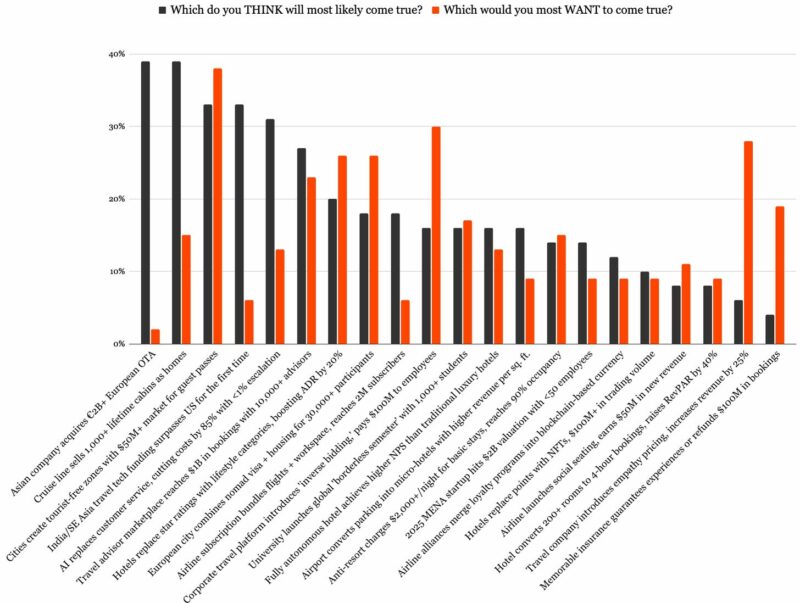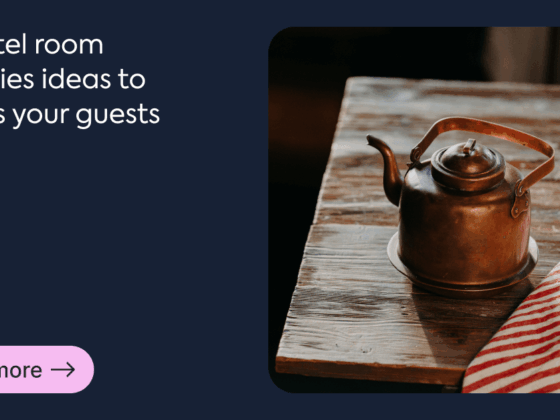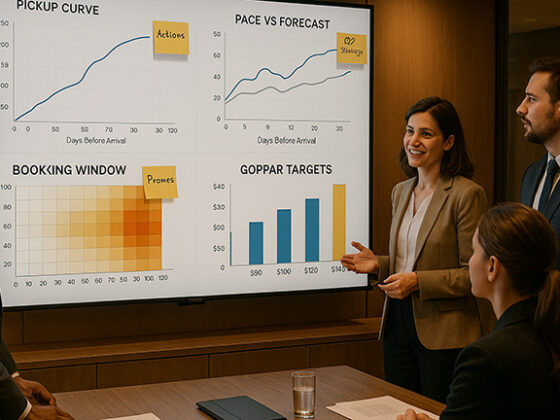
A hotel general manager (GM) focuses on stability and consistency. Unlike roles driven by rapid innovation or high-risk initiatives, a hotel GM’s success is often defined by their ability to maintain seamless operations, deliver a consistent guest experience, and uphold the property’s standards. This unique focus on stability comes from a practical reality: most general managers remain at a single hotel for only 3 to 5 years. GMs are less likely to undertake transformative projects within this limited time frame, as they may not be around to see the long-term impact or outcome of high-risk changes.
The typical GM approach centers on a “maintain” mindset, where the goal is to ensure that the hotel continues to perform at a high level and that guest satisfaction remains consistently strong. In this setting, change happens incrementally, with minor, steady improvements designed to support a stable operational flow rather than disrupt it.
However, maintaining this consistency and meeting performance targets without taking risks still requires a solid foundation of information. This is where business intelligence (BI) tools come into play. For a risk-averse GM, BI tools provide crucial insights to track operational performance, monitor financial stability, and respond proactively to guest feedback. By using reliable, intuitive BI systems, GMs can make informed decisions that support consistent results, helping them safeguard the hotel’s reputation and profitability throughout their tenure without needing to “reinvent the wheel.”
The Risk-Averse Nature of Hotel General Managers
Short-Term Tenure Mindset
For most hotel general managers, the reality of a 3-5 year tenure at a given property significantly shapes their approach to management. With this relatively short time frame, GMs often focus on achieving consistent results rather than implementing high-risk, transformative changes that might not show returns until after moving on. This short-term perspective leads many GMs to center their efforts on keeping operations steady, focusing on established practices that ensure the hotel meets or slightly exceeds its key performance metrics. The goal is to keep the hotel running smoothly so they can hand over a stable, well-functioning property to the next manager when they leave.
Focus on Stability
This tenure-driven mindset naturally fosters a focus on stability. General managers prioritize maintaining consistent quality, high guest satisfaction, and financial stability because these are the benchmarks by which they’re evaluated. GMs can be confident they’re fulfilling their core responsibilities by focusing on these steady-state goals. Risk-averse by nature, they often view disruptive initiatives—like major overhauls to technology systems or experimental guest programs—as potentially destabilizing, particularly if the benefits of such changes aren’t guaranteed within their tenure.
Instead, GMs make incremental improvements that align with established standards and proven approaches. They emphasize reliable operations, consistent service, and financial predictability, minimizing risks that could disrupt guest satisfaction or operational flow. This conservative approach allows them to maintain control over the guest experience and ensure a steady income for the hotel.
Accountability and Career Mobility
Hotel general managers are also acutely aware of their accountability to ownership and the impact of their tenure on their professional reputation. In the hospitality industry, reputation is a critical asset. A GM who can leave behind a stable, profitable, and smoothly operating property strengthens their career prospects. At the same time, any major disruptions or negative performance trends could have lasting effects on their standing within the industry.
With this in mind, GMs are cautious about implementing significant changes that could introduce volatility or carry the potential for visible failure. They aim to preserve the property’s standing, hand over a stable business to the next leader, and avoid reputational risks. This focus on career mobility encourages GMs to maintain continuity, knowing that it’s easier to earn a reputation for stability and consistent results than to gamble on high-risk strategies that may not pay off.
Ultimately, this combination of short tenure, emphasis on stability, and accountability creates a distinctively conservative, risk-averse mindset among hotel general managers. Their goal is to keep operations steady, uphold the hotel’s reputation, and ensure they leave behind a property in good standing when it’s time to move on.
The “Maintain” Attitude in Hotel Management
Avoidance of High-Risk Initiatives
For risk-averse hotel general managers, initiatives with uncertain payoffs are generally seen as distractions that could jeopardize the smooth day-to-day functioning of the property. High-risk projects—like revamping the hotel’s entire technology infrastructure, adopting new service models, or experimenting with untested marketing campaigns—may offer potential rewards. Still, they also carry the possibility of short-term disruption, guest dissatisfaction, and operational setbacks. Given the importance of maintaining consistent guest experiences, many GMs bypass these kinds of projects in favor of more predictable, stable endeavors.
Instead, they lean toward strategies and solutions with a clear track record of success, choosing projects that align closely with their goals of maintaining guest satisfaction, staff stability, and financial performance. Avoiding high-risk moves helps GMs ensure that the hotel’s reputation remains intact and that daily operations proceed without interruption.
Reliance on Established Processes
Another hallmark of the “maintain” attitude is a firm reliance on established processes and operational standards. For most GMs, consistency in service delivery is vital to running a successful hotel. Over time, their teams develop routines, standards, and best practices that ensure dependable service quality and operational efficiency. By relying on these tested procedures, GMs can meet performance expectations without reinventing the wheel or taking unnecessary risks.
Established processes also provide a safety net; when all team members understand and follow well-defined protocols, there’s less room for error or variation in service. For instance, relying on standardized check-in procedures, housekeeping routines, and revenue management practices allows the hotel to function like a well-oiled machine, ensuring guests receive a familiar and satisfactory experience. For a general manager focused on “maintain,” these stable processes are invaluable for achieving reliable results and maintaining control over every aspect of the property’s operations.
Incremental Changes Over Transformative Initiatives
Regarding improvement, GMs with a “maintain” attitude are more inclined to make small, incremental changes rather than large-scale transformations. These minor adjustments—whether a slight enhancement to the guest experience, a modest update in-room amenities, or a refined housekeeping schedule—are safer and less likely to disrupt operations. Incremental improvements offer immediate, manageable benefits that don’t require extensive resources or long-term commitments.
For instance, a GM might add a simple post-stay email survey instead of implementing a new guest feedback system to gather insights. Rather than a full-scale rebranding, they might refresh certain design elements in the lobby or guest rooms. These small changes enable GMs to show improvement without stepping outside their comfort zone or taking risks that could backfire.
The “maintain” attitude prioritizes stability, consistency, and predictable results. By avoiding high-risk initiatives, relying on established procedures, and opting for incremental changes over bold innovations, hotel general managers ensure that their property performs reliably, meets guest expectations, and remains financially sound during their tenure. This cautious approach aligns with their focus on handing over a well-functioning property and building a reputation for stability and reliability within the industry.
Business Intelligence Tools Essential for a “Maintain” Strategy
For risk-averse hotel general managers, the right business intelligence (BI) tools are essential for sustaining consistent performance without taking on additional risk. These tools enable GMs to closely monitor operational, financial, and guest metrics, providing insights that align with a stability-focused management style. Here are six critical BI tools that support a “maintain” approach effectively:
Operational Performance Dashboard
- Purpose: Real-time tracking for key metrics like occupancy rate, average daily rate (ADR), and revenue per available room (RevPAR).
- Value: It provides a daily snapshot of hotel performance, helping GMs quickly identify and respond to issues and keeping operations steady and predictable.
Automated Forecasting and Budgeting Tools
- Purpose: Data-driven forecasting that incorporates historical data and market trends.
- Value: Enables GMs to make informed, low-risk decisions regarding pricing and planning, ensuring revenue remains stable without venturing into uncertain territory.
Consolidated Revenue Reporting
- Purpose: Comprehensive view of total revenue, broken down by departments.
- Value: Offers insights into the performance of each revenue stream (rooms, F&B, spa, etc.), helping GMs maintain balanced revenue and spot any areas needing attention.
Guest Satisfaction Tracking
- Purpose: Monitoring of guest feedback, review scores, and satisfaction metrics.
- Value: Allows GMs to promptly address service issues, preserving the hotel’s reputation and ensuring guests receive consistent quality, which is crucial for repeat business.
Labor and Productivity Management
- Purpose: Tracking labor costs and productivity metrics, such as revenue per worked hours.
- Value: Helps optimize staffing levels to balance service quality with cost efficiency, ensuring operational stability is maintained without unnecessary expenses.
Competitor Benchmarking
- Purpose: Comparison of key metrics with those of similar hotels.
- Value: Provides perspective on market position, helping GMs set realistic performance goals and make informed pricing or service adjustments without taking on risky competitive moves.
Each BI tool supports the general manager’s goal of keeping the hotel running smoothly. They allow for proactive monitoring and quick adjustments without needing high-stakes decisions. By relying on these insights, GMs can maintain consistent performance, safeguard guest satisfaction, and uphold financial stability throughout their tenure.
How BI Tools Help GMs Achieve Success Without Taking Risks
Business intelligence tools are indispensable for hotel general managers who adopt a “maintain” approach. They provide reliable and actionable insights without necessitating radical changes. These tools enable GMs to focus on consistent performance, ensuring the hotel runs smoothly without unnecessary risks or disruptions. By leveraging BI tools, general managers can monitor essential metrics, track guest satisfaction, optimize staffing levels, and benchmark against competitors while maintaining operational stability.
For risk-averse GMs, BI tools offer the security of data-driven decision-making. Rather than relying solely on intuition, GMs can make informed choices grounded in historical data and current trends. This reinforces the hotel’s strengths without introducing volatility. Real-time alerts to emerging issues allow managers to respond quickly, preventing minor concerns from escalating into significant disruptions. The result is a steady, well-maintained property that consistently meets expectations for guest experience, operational efficiency, and financial performance.
Demand Calendar is the perfect BI tool for hotel general managers with this “maintain” mindset. Specifically designed to meet the unique needs of hotels, Demand Calendar offers functionality that helps GMs achieve steady, reliable outcomes. It provides all the essential insights without adding complexity, from consolidated revenue reporting and guest satisfaction tracking to labor productivity metrics and competitor benchmarking. This allows GMs to oversee operations confidently with a comprehensive, easy-to-use tool that supports stable, consistent performance throughout their tenure.
Additionally, Demand Calendar automatically documents performance metrics throughout a GM’s tenure. This feature creates a comprehensive record of achievements, enabling GMs to showcase their commitment to quality, consistency, and financial health. They can easily demonstrate how they’ve maintained standards and met targets, leaving a clear performance trail that reflects their dedication to stability and operational excellence.
This thorough documentation also adds value for the following general manager, who can step into a well-maintained property with a clear understanding of its performance history. By utilizing Demand Calendar, general managers achieve their goals of maintaining quality meeting targets and ensuring a seamless transition—leaving behind a hotel ready for continued success.
Conclusion
While hotel general managers may be naturally risk-averse, their commitment to stability and consistency is vital in keeping properties stable and profitable. Their focus on maintaining quality, guest satisfaction, and financial stability ensures that the hotel operates smoothly, upholds its reputation, and meets the high standards expected by guests and stakeholders alike.
Business intelligence tools, especially those designed for hotels’ specific needs, empower GMs to excel in this crucial role. By providing reliable insights into operational performance, revenue streams, and market positioning, these tools enable general managers to make data-driven decisions that reinforce the hotel’s strengths without introducing unnecessary risks. With the right BI tools, such as Demand Calendar, GMs can meet performance goals, document their achievements, and leave behind a well-maintained property ready for future success.
If you’re a general manager looking for a low-risk, high-value tool that can immediately support your “maintain” strategy, Demand Calendar is worth exploring. With its user-friendly interface, automated performance tracking, and tailored insights, Demand Calendar provides everything a GM needs to sustain quality, reach targets, and ensure seamless operations. Take a closer look at how Demand Calendar can empower you to protect your hotel’s legacy while optimizing for stability and success.







